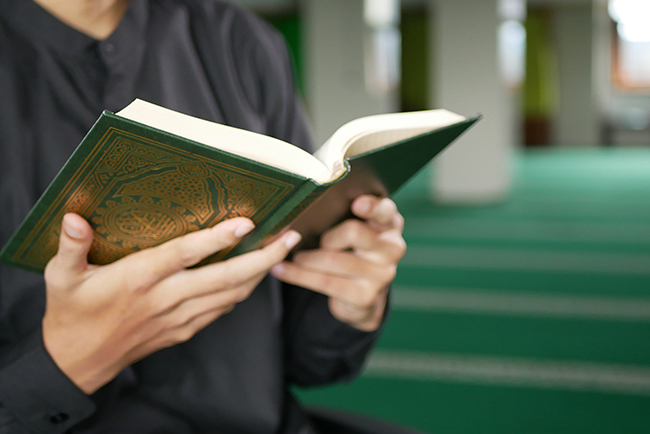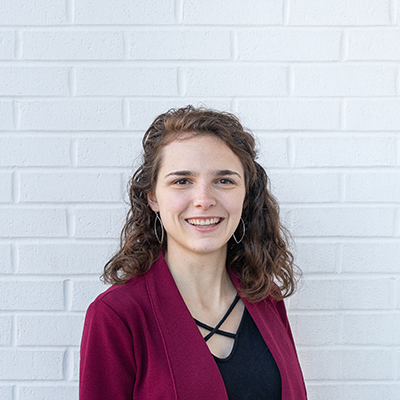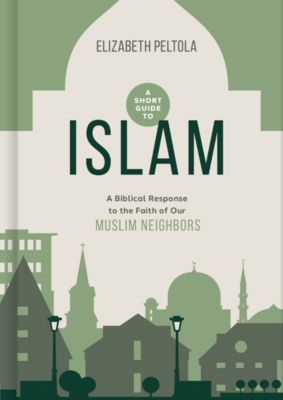
Christians with a heart for their Muslim neighbors need to understand Islamic beliefs and how to engage these beliefs biblically.
By Marissa Postell Sullivan
How do we love our Islamic neighbors well? The church can begin by knowing Christ and His call for every believer, but this knowledge must be put to practice. Christians with a heart for their Muslim neighbors need to understand Islamic beliefs and how to engage these beliefs biblically.
In her book A Short Guide to Islam, Elizabeth Peltola seeks to equip the church to engage in gospel conversations. Here’s a brief look at a recent conversation with Peltola on the significance of churches equipping their members for gospel engagement.
How did the Lord work in your story to cultivate your heart for Muslims?
Elizabeth Peltola: The Lord got a hold of my heart when I went to a mosque and got to speak with the imam. The only question I could think to ask was: “What do you do with Satan?” Up to this point, this imam, this Islamic leader of the mosque, had been really charming, really confident. But after I asked this question, his demeanor changed. He suddenly became petrified.
Within a few minutes, he was ushering out us out of the mosque. I remember thinking, “I’m still a struggling Christian. But I’m not afraid of the devil like this imam is. He’s a Muslim missionary to America, and he’s afraid.” As a 22-year-old, I knew I had power in the name of Jesus and the demons could flee.
Then three weeks before I graduated from Bible school, the Lord gave me this burden for Muslims in Britain. And that began the journey of delving into Islam, learning a biblical response to Islam, and learning how to be confident in sharing my faith with Muslims.
What did you think was missing from the conversation about Islamic faith and engaging with Muslims that led you to write this book?
When I began to study Islam, I found there were a lot of Christian books on testimonies of Muslims leaving the Islamic faith and becoming Christians. There were a lot of testimonies on culturally engaging Islam. And there were a lot of Christian books on Arab Islam. But even to date I don’t find a huge number of Christian books that grapple with the theology of Islam and engage it biblically on a deep level.
“We have such a wealth of material—just from the Bible—to know how to respond to Muslims and how to understand Islam from the mind of God.” — Elizabeth Peltola Click To TweetThe Bible has a lot to say about Islam. We have such a wealth of material—just from the Bible—to know how to respond to Muslims and how to understand Islam from the mind of God.
What do you wish pastors in the West understood about Islam?
Pastors and church leaders have to recognize that where Christianity is being removed and secularism is growing, Islam fills that religious void. So, if Christianity becomes weak in its theology, Islam will become that voice. If we can encourage our congregations to be vocal and open with clear presentations of the faith in all aspects of life, we may be able to be the ones who fill that religious void left by growing secularism. A quarter of the world’s population belongs to Islam. Whether we like it or not, we have to engage this religion.
The State of Theology from Lifeway Research found almost 7 in 10 Americans (67%) say God accepts the worship of all religions, including Christianity, Judaism, and Islam. Why do you think this myth is so prevalent?
As Christians, we tend to be quite loving and caring toward others, but in our love and care of others, we fail to make a distinction between loving someone and loving their ideas. True biblical love does not mean we accommodate everyone’s ideas. The God of the Bible does not accommodate Islamic ideas.
God loved a world that hated Him. God did not agree with that world, but He loved us so much He died for us. He did something about our brokenness and all of our false ideas. But His love did not accommodate all that we were and all that we thought. If we really love truth, we will confront falsehood like God does.
“True biblical love does not mean we accommodate everyone's ideas.” — Elizabeth Peltola Click To TweetThe prevalence of this myth extends even to the church. Only 38% of Americans with evangelical beliefs disagree with the statement “God accepts the worship of all religions, including Christianity, Judaism, and Islam.” How can pastors and church leaders address these myths in the church?
We have a challenge to get back to a love of the Word of God and a love of the God it talks about. The Word of God must inform us about the world we live in. We’ve got to go back to the Word of God and stand firm on it. It’s a solid foundation and the path through all of the mess and all of the confusion.
Why is it important for Christians to understand the beliefs of their Muslim neighbors?
You don’t have to know anything about Islam to be a witness to Muslims. We just need to know the Lord Jesus. But if we have Muslim friends, it can be helpful to learn about Islam, especially from a biblical perspective.
When you know Jesus, know the Word of God, know the Father, Son, and Holy Spirit, then when a Muslim friend says something to you, you know how to respond. But learning about Islam protects us from converting to the religion and from accommodating it and assimilating it into Christianity. It also helps us communicate biblical truth on a much deeper level with our Muslim friends.
How can pastors lead the way in loving their Islamic neighbors?
Make sure the believers in your church serving among their Muslim neighbors understand the differences between Islam and Christianity. Make sure they’re sound on the Word of God, they’re sound on the gospel, and they’re taking the message of Christ clearly to the Muslim world.
Wise love is love and truth together. As we reach out to Muslim friends, we meet them on a human level. A minister and his church need to stay true to the faith of Christ but be able to counter the lies of Islam. Whenever a Muslim says something that counters Christianity, we can have a wonderful gospel conversation.
As more of the world moves into our neighborhoods, how can Christians best respond to and engage with their Muslim neighbors?
As Christians, we can rise above the noise, the angst, and the fear. We’ve got to remain missional at our core. If there are unbelievers on our street, our mission and ultimate aim is to share the love of the Lord practically and through our words.
Why should pastors invest the time in helping their churches understand Islam and how to engage with their Muslim neighbors?
A lot of people watching Islam, watching what happens on the world stage can get wrapped up in the fear and political rage. It can really hurt us and hurt our witness to a Muslim. But we hold the solution. We hold the gospel. There is hope.
“Imagine if every Muslim in our neighborhoods heard a clear presentation of Christ in our conversations as we shared life with them as human beings.” — Elizabeth Peltola Click To TweetRegardless of what’s happening in our land, regardless of the fears we have, we carry the message of hope. Imagine if every Muslim in our neighborhoods heard a clear presentation of Christ in our conversations as we shared life with them as human beings. Some of the people around us are Muslims. Let’s be Christ to all, just like Jesus tells us to.
How can pastors equip their churches to understand the theological differences between Islam and Christianity?
I wrote A Short Guide to Islam for small groups. I don’t want people to just learn about Islam. Let’s always biblically engage the world around us. The book is written in a way that will help people biblically engage the misconceptions out there. And if we’re confident in our own faith, at the moment a Muslim makes their statement about any of those topics, we’ll know how to respond because we’re biblically grounded in those areas.
At One Truth Project, we also offer churches around the world a two-hour Q&A. We’ll biblically work through any question they have on Islam.
For permission to republish this article, contact Marissa Postell Sullivan.











